-
11-13-2023
Digital technology for the prevention of healthcare-related infections in critical care
Revista Brasileira de Enfermagem. 2023;76:e20220528
Abstract
Digital technology for the prevention of healthcare-related infections in critical care
Revista Brasileira de Enfermagem. 2023;76:e20220528
DOI 10.1590/0034-7167-2022-0528
Views0See moreABSTRACT
Objective:
To develop digital technology for patient and family integration into the Intensive Care Unit care team, aiming to subsidize decision-making for the prevention of infections related to healthcare.
Method:
Methodological research of technological production in three phases: pre-production, production, and post-production in a teaching hospital in southern Brazil. Sixteen intensive care unit nurses participated.
Results:
The research produced six videos: general guidelines on the Intensive Care Unit, Preventing infections: hand hygiene; Pneumonia associated with mechanical ventilation; Catheter-associated primary bloodstream infection; Catheter-related urinary tract infection.
Final considerations:
The proposed technology was developed and aims to assist nurses in bringing patients and families closer to the routines of the intensive care environment to provide safety in the contact of the patient of intensive care units with family members and in the active participation for the prevention of infections related to healthcare.
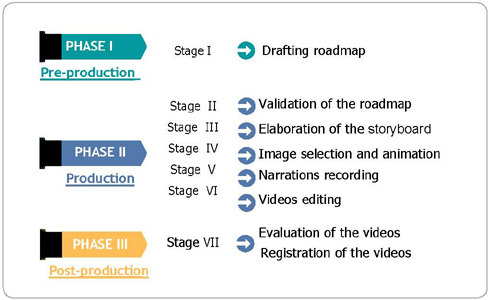
-
ORIGINAL ARTICLE11-13-2023
Development of educational videos about bathing in bed newborns admitted to a neonatal unit
Revista Brasileira de Enfermagem. 2023;76:e20220778
Abstract
ORIGINAL ARTICLEDevelopment of educational videos about bathing in bed newborns admitted to a neonatal unit
Revista Brasileira de Enfermagem. 2023;76:e20220778
DOI 10.1590/0034-7167-2022-0778
Views0See moreABSTRACT
Objective:
to develop and analyze evidence of content validity of educational videos about bathing newborns in bed in a neonatal unit.
Method:
applied and methodological research, carried out from December/2020 to February/2022, in three phases: pre-production, production, post-production. Validity was carried out by nurses specializing in social communication and nursing professionals, including the Brazilian Sign Language and assessment by nursing students. The Content Validity Index and Cronbach’s alpha above 0.8 were considered for analysis.
Results:
the videos were entitled “Best practices: bathing newborns in the heated crib” and “Best practices: bathing newborns in the incubator”, lasting seven minutes each, divided into six scenes that demonstrated the approach to parents, environment and material organization, preparing newborns, bathing and after-bath care.
Conclusion:
the videos will support permanent education processes, academic training and professional training in nursing.
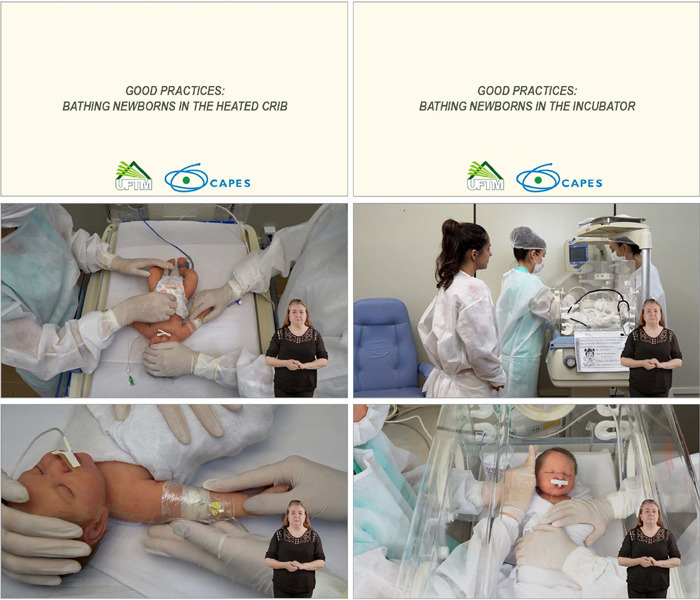
-
ORIGINAL ARTICLE11-13-2023
Access of people with pulmonary tuberculosis to government programs: Primary Care professionals’ perceptions
Revista Brasileira de Enfermagem. 2023;76:e20220716
Abstract
ORIGINAL ARTICLEAccess of people with pulmonary tuberculosis to government programs: Primary Care professionals’ perceptions
Revista Brasileira de Enfermagem. 2023;76:e20220716
DOI 10.1590/0034-7167-2022-0716
Views0See moreABSTRACT
Objective:
to analyze Primary Health Care professionals’ perceptions about the access of people with pulmonary tuberculosis to government social support and income transfer programs.
Methods:
multicenter/qualitative study, carried out in Family Health Units in four Brazilian capitals: Belém/Pará, Campo Grande/Mato Grosso do Sul, Recife/Pernambuco and Rio de Janeiro/Rio de Janeiro. Fifty-eight professionals participated (social workers, dentists, nurses, pharmacists, physicians and nursing technicians), who provided assistance to people with pulmonary tuberculosis. Individual interviews were conducted, and the content analysis technique was used.
Results:
among the participants, 45/77.6% were women and 33/56.9% were between 25 and 40 years old. Two thematic categories were organized, demonstrating the perceptions about the possibilities of access to government programs by people with pulmonary tuberculosis in vulnerable situations and the obstacles inherent to this context.
Final considerations:
it is necessary to move forward in improving patient access to social programs.
-
ORIGINAL ARTICLE11-13-2023
Vulnerability to physical inactivity: evidence of content validity and response processes
Revista Brasileira de Enfermagem. 2023;76:e20220563
Abstract
ORIGINAL ARTICLEVulnerability to physical inactivity: evidence of content validity and response processes
Revista Brasileira de Enfermagem. 2023;76:e20220563
DOI 10.1590/0034-7167-2022-0563
Views0See moreABSTRACT
Objective:
To analyze content validity evidence and response processes of a bank of items for measuring vulnerability to physical inactivity in adults.
Method:
Methodological study, with 13 specialists and 46 representatives of the target population. The Content Validity Index (CVI) and binomial test were calculated; data obtained through validity based on response processes were collected through interviews.
Results:
Of the 105 constructed items, 16 were excluded (CVI<0.78); 89 items showed agreement <80% in the psychometric criteria, being modified. Of the 101 items that remained (CVI>0.78), 34 were changed and 4 were deleted after evaluating the evidence of response processes. In the end, 97 items remained, with a global CVI of 0.92, organized into two dimensions: Subject (CVI=0.91) and Social (CVI=0.94).
Conclusion:
The items presented adequate parameters and evidence of validity; and can subsidize the construction of instruments that consider the subject’s and social vulnerability in understanding physical inactivity.
-
ORIGINAL ARTICLE11-13-2023
Transphobia as a social disease: discourses of vulnerabilities in trans men and transmasculine people
Revista Brasileira de Enfermagem. 2023;76:e20220183
Abstract
ORIGINAL ARTICLETransphobia as a social disease: discourses of vulnerabilities in trans men and transmasculine people
Revista Brasileira de Enfermagem. 2023;76:e20220183
DOI 10.1590/0034-7167-2022-0183
Views0See moreABSTRACT
Objective:
to analyze the repercussions of transphobia on trans men’s and transmasculine people’s health.
Method:
a qualitative study carried out with 38 participants, 35 trans men and three trans men, who attended specialized transgender health services in Bahia, Brazil. In-depth interviews were carried out between June 2019 and February 2020. The Discourse of Collective Subject technique was used and interpretation based on the theoretical concept of transphobia.
Results:
transphobia has intra and interpersonal repercussions on the life and health of trans men and transmasculine people who attend health services. There were experiences of violence in the private space, fraying of family ties; discrimination in the school space; limitation in professional/work opportunities; barriers to self-care and access to health services; elaboration of trans identity protection strategies; consequences of transphobia on psycho-emotional health.
Conclusion:
transphobia is a social disease that affects different life and health dimensions. It causes damage to the socialization of trans men and transmasculine people, in addition to health service spaces as well as in family environments, schools, universities and at work, which result in non-adherence to self-care, distancing from health services and psycho-emotional distress.
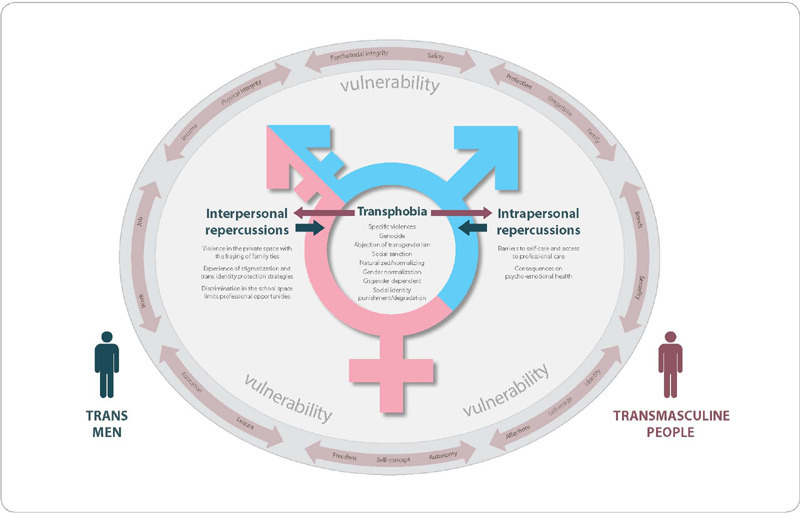
-
ORIGINAL ARTICLE11-10-2023
Validation of the Advanced Practice Nursing Competency Assessment Instrument in a hospital environment
Revista Brasileira de Enfermagem. 2023;76:e20220705
Abstract
ORIGINAL ARTICLEValidation of the Advanced Practice Nursing Competency Assessment Instrument in a hospital environment
Revista Brasileira de Enfermagem. 2023;76:e20220705
DOI 10.1590/0034-7167-2022-0705
Views0See moreABSTRACT
Objectives:
to evaluate the measurement properties of the Advanced Practice Nursing Competency Assessment Instrument – Brazilian version, in the hospital environment.
Methods:
a methodological study conducted in a hospital with 238 nurses. Three instruments collect the data: sample characterization form, Brazilian version of the Advanced Practice Nursing Competency Assessment Instrument, and the category “therapeutic interventions” of the nurse competence scale. Construct validity was verified by confirmatory factor analysis and Spearman’s correlation coefficient, and reliability by Cronbach’s Alpha and composite reliability.
Results:
in the factor analysis, the model converged to a satisfactory result. The study found acceptable evidence of reliability (Cronbach’s Alpha, 0.76-0.87; and composite reliability, 0.85-0.90).
Conclusions:
the instrument demonstrated evidence of construct validity and internal consistency and can be used in practice
-
11-10-2023
HeLP: Development of occupational protection mask against surgical smoke
Revista Brasileira de Enfermagem. 2023;76:e20220647
Abstract
HeLP: Development of occupational protection mask against surgical smoke
Revista Brasileira de Enfermagem. 2023;76:e20220647
DOI 10.1590/0034-7167-2022-0647
Views0See moreABSTRACT
Objectives:
to describe a technological innovation in the development of an individual, ergonomic, sustainable and effective occupational respiratory protection mask for workers exposed to surgical smoke.
Methods:
applied, exploratory, quantitative research, using design methods and tools: Sense Intent, Know Context, Know People, Frame Insights, Explore Concepts, Frame Solutions, Realize Offerings, in addition to the Product Development Process tools. It was developed from March 2019 to December 2021.
Results:
from the prototyping mold, it became possible to represent the abstract to the physical, where all the concepts created in the methodological steps were implemented and the necessary adjustments were made to create the model as a technological innovation, which will have the concept for product commercialization.
Conclusions:
a mask for protection against surgical smoke (HeLP) was developed, from the design step to the prototype development, being a technological innovation.

-
11-10-2023
Technology for the treatment promotion of adults living with HIV: Positive o Cuidado (Positive the Care)
Revista Brasileira de Enfermagem. 2023;76:e20220454
Abstract
Technology for the treatment promotion of adults living with HIV: Positive o Cuidado (Positive the Care)
Revista Brasileira de Enfermagem. 2023;76:e20220454
DOI 10.1590/0034-7167-2022-0454
Views0See moreABSTRACT
Objectives:
to develop a responsive website focused on treatment adherence for adult users living with HIV.
Methods:
technological study conducted between August and October 2020, in the light of Pierre Lévy’s theoretical-philosophical framework, using the Double Diamond Process methodology associated with the five stages of The Elements of User Experience framework.
Results:
it was developed the responsive website Positive Care (Positive o Cuidado), composed of an initial presentation screen and 13 other screens named: Family Health and You; Undetectable = Untransmissible; Antiretroviral Drugs; Routine Tests; Vaccination; Antiretroviral Delivery; Drug Interactions; Combined Prevention; Support Services; Healthy Life; Family and Reproductive Planning; Covid 19; and Questions, Curiosities, and Myths.
Final Considerations:
the responsive website was developed based on the software design and programming process and has requirements/functionalities with the potential to strengthen the collective intelligence about HIV and, consequently, to promote treatment adherence by its users.
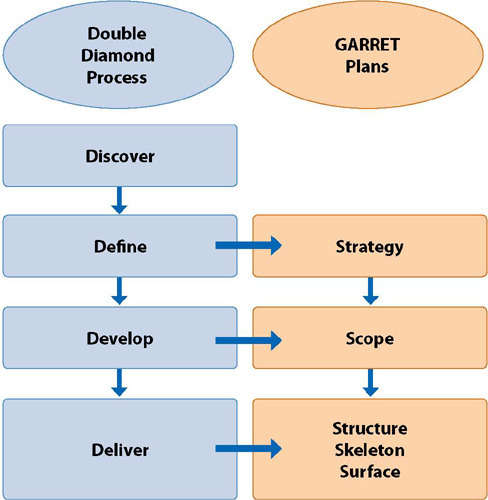
-
01-01-2016
Peritoneal dialysis: family care for chronic kidney disease patients in home-based treatment
Revista Brasileira de Enfermagem. 2016;69(6):1172-1178
Abstract
Peritoneal dialysis: family care for chronic kidney disease patients in home-based treatment
Revista Brasileira de Enfermagem. 2016;69(6):1172-1178
DOI 10.1590/0034-7167-2016-0262
Views0See moreABSTRACT
Objective:
to propose a family care model for patients with chronic kidney disease in peritoneal dialysis based on evidence indicated by family members.
Method:
this was a qualitative descriptive study that used the Convergent Care Research method. It was conducted at a state hospital in Rio de Janeiro, including techniques for recording individual interviews and consisted of a group of 19 study participants. Data were analyzed according to the stages proposed by the method, generating a category that used a cultural question as the basis for patient care resulting in a proposal for home-based family care.
Results:
the patient care model proposed includes dialogue and reflection in sharing the knowledge of “professional” and “popular” systems, aiming to improve the patient’s quality of life.
Conclusion:
family members were able to promote care based on cultural preservation, accommodation and repatterning, as proposed by Leininger’s Sunrise Model.
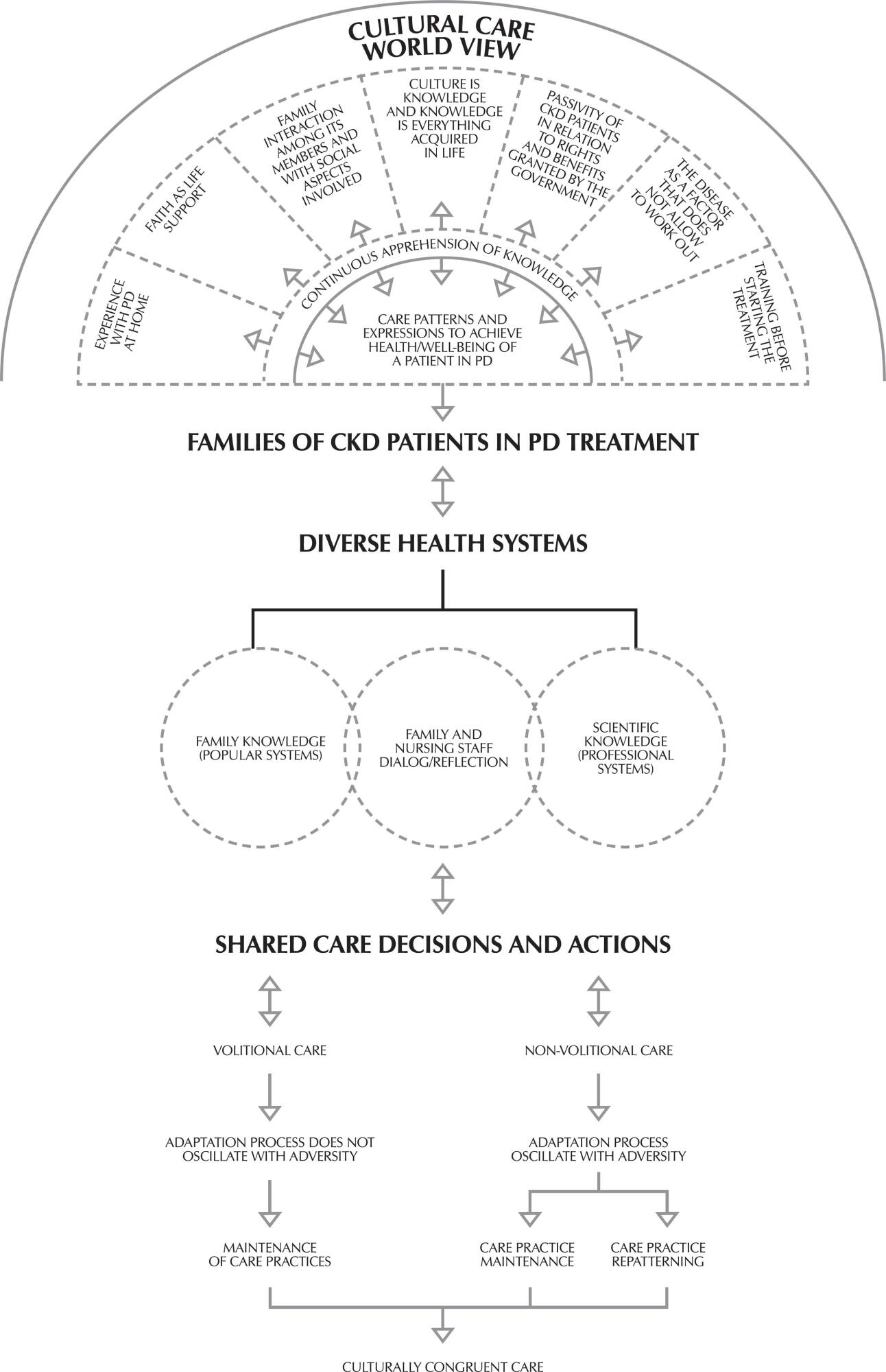
-
01-01-2016
Technology for self-care for ostomized women’s sexual and reproductive health
Revista Brasileira de Enfermagem. 2016;69(6):1164-1171
Abstract
Technology for self-care for ostomized women’s sexual and reproductive health
Revista Brasileira de Enfermagem. 2016;69(6):1164-1171
DOI 10.1590/0034-7167-2016-0302
Views0See moreABSTRACT
Objective:
to validate the technology of printed booklets on self-care for ostomized women’s sexual and reproductive health.
Method:
a methodological study was performed with a focus on the construction and validity of a printed booklet. The content of this booklet was validated by 11 specialist judges/nurses, according to a Content Validity Index (CVI) equal to or higher than 0.80. Appearance was validated by nine ostomized women, according to an assessment of the difficulty and convenience of the educational material.
Results:
the booklet was validated by specialists, with an overall mean CVI equal to 0.87. Moreover, the target population showed 100% of agreement in terms of the adequacy of organization, writing style, appearance and motivation of this booklet.
Conclusion:
the educational technology in question was validated according to content and appearance, thus representing an adequate, reliable and easily understandable resource to acquire knowledge about self-care for ostomized women’s sexual and reproductive health.

-
01-01-2016
Short-course therapy for tuberculosis: a discourse analysis
Revista Brasileira de Enfermagem. 2016;69(6):1154-1163
Abstract
Short-course therapy for tuberculosis: a discourse analysis
Revista Brasileira de Enfermagem. 2016;69(6):1154-1163
DOI 10.1590/0034-7167-2016-0330
Views0See moreABSTRACT
Objective:
to analyze the meanings produced by nursing professionals in the directly observed treatment (DOT) for tuberculosis (TB) in the city of São Paulo.
Method:
this is a qualitative study, conducted in March and April 2014 through semi-directed interviews with nine nurses. The empirical material produced was analyzed according to the theoretical and methodological support of the Discourse Analysis of French matrix.
Results:
results have emerged as three discursive blocks: conditions for the production of tuberculosis control practices; production conditions facilitating the treatment of tuberculosis; and production conditions hindering the treatment of tuberculosis.
Conclusion:
these professionals’ words produce different meanings, which suggest that the practices of nursing professionals allow the patient to search for a cure, which is reinforced by incentives of a social nature, but permeated by the vicissitudes that are circumscribed in the ill person’s everyday production conditions.
-
00-00-0000
Representações cotidianas de jovens sobre a periferia
. ;
Abstract
Representações cotidianas de jovens sobre a periferia
. ;
Views0RESUMOObjetivos:compreender as representações cotidianas de jovens sobre a periferia, com a finalidade de compor os temas para programas midiáticos de educação sobre drogas.Método:abordagem marxista, com pesquisa-ação emancipatória e participação em oficinas de 13 jovens de uma escola pública da periferia de São Paulo.Resultados:entre os jovens há representações cotidianas contraditórias sobre o papel do Estado, que, […]See more -
01-01-2016
Aids in the elderly: reasons that lead to late diagnosis
Revista Brasileira de Enfermagem. 2016;69(6):1140-1146
Abstract
Aids in the elderly: reasons that lead to late diagnosis
Revista Brasileira de Enfermagem. 2016;69(6):1140-1146
DOI 10.1590/0034-7167-2016-0370
Views0See moreABSTRACT
Objective:
to investigate elderly living with HIV/Aids and health professionals, what are the reasons that lead to late diagnosis of HIV infection in the elderly.
Method:
prospective, qualitative study, conducted at a specialized outpatient clinic with elderly living with HIV/Aids, diagnosed age over 60 years and in the Family Health Strategy units with nurses and physicians. Data were collected through interviews and verified by content analysis, using the theoretical framework of vulnerability.
Results:
a total of 11 elderly, 11 nurses and 12 physicians participated in the study. Three empirical categories emerged: the late diagnosis of HIV happens against the health service; invisibility of the sexuality of the elderly; and weaknesses in the anti-HIV serology request for the elderly.
Conclusion:
there are health professionals who see the elderly as asexual, causing the diagnosis of HIV to happen in the secondary and tertiary service instead of primary care.
-
01-01-2016
Storytelling: a care technology in continuing education for active ageing
Revista Brasileira de Enfermagem. 2016;69(6):1132-1139
Abstract
Storytelling: a care technology in continuing education for active ageing
Revista Brasileira de Enfermagem. 2016;69(6):1132-1139
DOI 10.1590/0034-7167-2016-0390
Views0See moreABSTRACT
Objective:
assessing relevance and effectiveness of care/educational technology in the form of “storytelling” as a strategy in the cultivation of active ageing (AA) for elderly users of a Basic Health Unit (BHU), from the Amazon region.
Method:
convergent care research (CCR) held in a BHU in Belém, state of Pará, with eight elderly ladies for testing this technology. An active ageing assessment questionnaire and WHOQOL-BREF – quality of life assessment were applied. After training with a view to continuing education, elderly ladies told stories for an audience that addressed the question: “What did you learn from it for your life?”
Results:
tThe popular stories elicited reactions from which the following categories emerged: solidarity; respect for the other; imagination, dreams, hopes and culture of the Amazonian. This practice had a positive result, producing changes in the quality of life of the elderly, particularly in the psychological domain.
Conclusion:
“storytelling” proved to be an innovative technology, a relevant and effective resource in health education, especially for active ageing.

-
01-01-2016
Nurse care practices in the Family Health Strategy
Revista Brasileira de Enfermagem. 2016;69(6):1124-1131
Abstract
Nurse care practices in the Family Health Strategy
Revista Brasileira de Enfermagem. 2016;69(6):1124-1131
DOI 10.1590/0034-7167-2016-0273
Views1See moreABSTRACT
Objective:
to analyze the practices of care of nurses working in teams of the family health strategy, from the perspective of users.
Method:
qualitative research conducted with 34 registered users in seven family health units of a municipality of Bahia from June to December 2014. The results were organized by the technique of content analysis.
Results:
users showed satisfaction with the nurse care due to listening, warmth and resolution of their health needs, despite the emphasis on procedures and programs targeted to populational groups. The dissatisfaction stems from the authoritarian, prescriptive and inflexible attitude in the nurse care. It was also emphasized that the home visits are directed to the bedridden and more restricted to preventive actions. Educational activities occur during the nursing consultation and in the health unit.
Conclusion:
there is urgent need of redefining the care as a structuring axis of the nurse practice.
-
01-01-2016
Interdisciplinary care praxis in groups of people living with fibromyalgia
Revista Brasileira de Enfermagem. 2016;69(6):1115-1123
Abstract
Interdisciplinary care praxis in groups of people living with fibromyalgia
Revista Brasileira de Enfermagem. 2016;69(6):1115-1123
DOI 10.1590/0034-7167-2016-0279
Views0See moreABSTRACT
Objectives:
to analyze the integrated community therapy model for the empowerment of people living with fibromyalgia and discuss the impact of this interdisciplinary intervention in the health-disease process and self-care.
Method:
a participatory-approach qualitative study, developed in 2015 with 11 participants at the Laboratory of Physiology Applied to Physical Education of the Rio de Janeiro State University, RJ. Data production comprised World Café, participant observation and semi-structured interview. The analysis was performed according to Bardin, through data triangulation in dialogue with the relevant literature.
Results:
the integrated community therapy group is a driving force in building and expanding knowledge about fibromyalgia and in self-care empowerment.
Conclusion:
this group strategy proved to be an interdisciplinary praxis tool that enables the development of solidary care networks. Thus, shared knowledge was generated, transformed into a listening and reflection environment to manage personal and family obstacles.
-
ORIGINAL ARTICLE09-06-2024
Factors associated with burnout in military police officers in a city in Paraná
Revista Brasileira de Enfermagem. 2024;77(4):e20230510
Abstract
ORIGINAL ARTICLEFactors associated with burnout in military police officers in a city in Paraná
Revista Brasileira de Enfermagem. 2024;77(4):e20230510
DOI 10.1590/0034-7167-2023-0510
Views0See moreABSTRACT
Objective:
to analyze the association between burnout and sociodemographic, work factors, lifestyle habits and health conditions of military police officers in a municipality in the state of Paraná, Brazil.
Method:
cross-sectional research with 131 military police officers. Data were analyzed using the Statistical Package for the Social Sciences software and the R program. Chi-square, Fisher’s exact and Poisson Generalized Linear Model tests were used.
Results:
most participants (65.6%) had a high level of burnout. In relation to protective factors, those who carried out leisure activities had a 33.6% chance of not developing burnout. Conjugality was also a protective factor. Not practicing physical activity and leisure activities are factors that can contribute to the occurrence of burnout.
Conclusions:
important factors and high rates of burnout were observed in the police officers investigated. It is necessary to implement public health policies to reduce burnout with attention focused on this professional category.
-
ORIGINAL ARTICLE09-06-2024
Development and content validation of a risk classification instrument
Revista Brasileira de Enfermagem. 2024;77(4):e20230502
Abstract
ORIGINAL ARTICLEDevelopment and content validation of a risk classification instrument
Revista Brasileira de Enfermagem. 2024;77(4):e20230502
DOI 10.1590/0034-7167-2023-0502
Views0See moreABSTRACT
Objective:
Develop and validate the content of an instrument for patient risk classification in emergency services of Primary Health Care.
Method:
The study included two stages: item generation and content validity. A literature review and retrospective analysis of medical records were conducted to create the instrument items. The Content Validity Ratio (CVR) was used to assess agreement among judges during content validation.
Results:
In the first and second rounds, 75 and 71 judges validated the risk classification instrument, respectively. The minimum adherence score for the latent variable item based on the final number of judges was 0.22 and 0.18; thus, 52 items, divided into three classification categories (red, orange, and yellow), were retained.
Conclusion:
The instrument was considered valid regarding clarity, relevance, pertinence, and agreement regarding the severity indicated in the item.
-
REVIEW09-06-2024
Nursing students’ mindfulness and emotional regulation: an integrative review
Revista Brasileira de Enfermagem. 2024;77(4):e20230466
Abstract
REVIEWNursing students’ mindfulness and emotional regulation: an integrative review
Revista Brasileira de Enfermagem. 2024;77(4):e20230466
DOI 10.1590/0034-7167-2023-0466
Views0See moreABSTRACT
Objective:
to identify the scientific evidence available in national and international literature on the relationships between nursing students’ mindfulness and emotional regulation.
Methods:
an integrative literature review, in four databases, with a time frame from January 2002 to December 2022. Articles in English, Spanish and Portuguese available in full were included.
Results:
the sample consisted of six original articles, predominantly with a quantitative approach, with cross-sectional designs standing out.
Conclusion:
the synthesis of scientific production revealed that there is a lack of research at national and international level on the subject with experimental and qualitative designs that enable conclusions about cause and effect and/or take into account subjective experiences of the applicability of mindfulness-based practice in nursing students’ emotional regulation.

-
ORIGINAL ARTICLE09-06-2024
Nursing Process implementation in a gerontogeriatric context: qualitative research
Revista Brasileira de Enfermagem. 2024;77(4):e20230465
Abstract
ORIGINAL ARTICLENursing Process implementation in a gerontogeriatric context: qualitative research
Revista Brasileira de Enfermagem. 2024;77(4):e20230465
DOI 10.1590/0034-7167-2023-0465
Views0See moreABSTRACT
Objective:
to describe Nursing Process implementation in a faith-based senior living community.
Method:
strategic action research with 19 nursing professionals and three managers of a faith-based senior living community. Implementation took place in four phases: diagnosis, planning, implementation and assessment. The data collected through semi-structured interviews and focus groups were subjected to discursive textual analysis.
Results:
the central categories were constructed: Nursing Process in faith-based senior living community: diagnosis of knowledge and application; Nursing Process in faith-based senior living community: implementation; Nursing process in faith-based senior living community: assessment after its implementation.
Conclusion:
Nursing Process implementation made it possible to structure work management/organization, contributing to knowledge, organization and continuity of care for safety and professional support.
-
ORIGINAL ARTICLE09-06-2024
Adherence to sepsis protocol in a high-risk maternity reference center
Revista Brasileira de Enfermagem. 2024;77(4):e20230453
Abstract
ORIGINAL ARTICLEAdherence to sepsis protocol in a high-risk maternity reference center
Revista Brasileira de Enfermagem. 2024;77(4):e20230453
DOI 10.1590/0034-7167-2023-0453
Views0See moreABSTRACT
Objective:
To describe the adherence to the sepsis protocol by obstetric nurses in the obstetric triage of a high-risk maternity reference center.
Methods:
This was a quantitative, documental, and retrospective study involving 105 pregnant women treated in obstetric triage under sepsis criteria. Data were collected through electronic medical records using structured forms and were organized into tables employing descriptive statistics. This research adhered to ethical principles concerning human studies.
Results:
Of the checklists for initiating the SEPSIS protocol by obstetric nurses, 105 were identified. Regarding the protocol steps performed, lactate was collected in 97.1% of cases and blood cultures in 98.1%, antibiotic therapy was administered in 94.3%, and hydration was carried out in 51.4% of the cases.
Conclusion:
The initiation of the sepsis protocol for all women meeting the criteria was confirmed. However, the steps were not fully implemented as recommended by the institutional protocol, and the recommended broad-spectrum antibiotic was not administered.
-
ORIGINAL ARTICLE09-06-2024
Effect of Brazilian green propolis in chronic ulcer treatment: a randomized clinical trial
Revista Brasileira de Enfermagem. 2024;77(4):e20230418
Abstract
ORIGINAL ARTICLEEffect of Brazilian green propolis in chronic ulcer treatment: a randomized clinical trial
Revista Brasileira de Enfermagem. 2024;77(4):e20230418
DOI 10.1590/0034-7167-2023-0418
Views0See moreABSTRACT
Objective:
to assess the effectiveness of 5% Brazilian green propolis (ointment) in individuals with chronic ulcers.
Methods:
a randomized clinical trial, developed with 40 patients randomized equally to control group (treated with essential fatty acid) and experimental group (treated with 5% green propolis) for 30 days. The outcomes of interest were sociodemographic, clinical and laboratory characteristics, lesion characteristics, such as type of tissue in the bed, presence of exudate, edge characteristics, microbial content and pain.
Results:
regarding sociodemographic, clinical and laboratory characteristics, the two groups did not show statistically significant differences. After assessment in 30 days, an effect was observed for both treated groups, but for the experimental group, greater effectiveness in terms of the type of tissue in the bed, type of exudate, edge characteristics, microbial content and pain.
Conclusion:
propolis-based ointment showed a healing effect, presenting itself as a potential tool in healing chronic ulcers.
-
09-06-2024
Progress Test in nursing: perspectives for undergraduate education
Revista Brasileira de Enfermagem. 2024;77(4):e20230413
Abstract
Progress Test in nursing: perspectives for undergraduate education
Revista Brasileira de Enfermagem. 2024;77(4):e20230413
DOI 10.1590/0034-7167-2023-0413
Views0See moreABSTRACT
Objective:
to reflect on the perspectives of adopting the Progress Test in undergraduate nursing education.
Methods:
this is a reflective study, based on authors’ critical thinking and supported by national and international literature on the Progress Test application in undergraduate health courses.
Results:
the Progress Test is as a valuable teaching-learning strategy, with potential applications and benefits for students, professors, and academic management.
Final considerations:
systematic nursing education assessment indicates valuable information for different stakeholders. Understanding its potential benefits, the Progress Test is presented as a strategy that can be replicated in undergraduate nursing education, either individually, by institutions, or collaboratively, by the establishment of partnerships or consortiums of institutions.
-
ORIGINAL ARTICLE09-06-2024
Physical and psychological changes of the COVID-19 infodemic by the older adult population
Revista Brasileira de Enfermagem. 2024;77(4):e20230339
Abstract
ORIGINAL ARTICLEPhysical and psychological changes of the COVID-19 infodemic by the older adult population
Revista Brasileira de Enfermagem. 2024;77(4):e20230339
DOI 10.1590/0034-7167-2023-0339
Views0See moreABSTRACT
Objective:
to analyze the physical and psychological changes of the COVID-19 infodemic for the older adult population of Rio de Janeiro.
Method:
a cross-sectional, web-based survey to find out about access to news and information about COVID-19 among older adult in Rio de Janeiro, between July and December 2020. Univariate analysis and bivariate analysis were carried out using non-parametric statistical methods.
Results:
390 older adults took part, predominantly female (75.1%), aged between 66 and 75 (35.4%), married (51.0%), white (60.3%), owning their own home (81.8%), located in urban areas (91%), with complete or incomplete primary education (31.8%) and retired or pensioners (79.2%). Younger people were significantly affected both physically and psychologically by social networks when compared to television (<0.001).
Conclusion:
Physical and psychological changes from exposure to information about COVID-19 have affected the lives of the older adult, having an impact on this population.
Search
Search in:
Nuvem de Tags
Adolescente (85) Atenção Primária à Saúde (239) COVID-19 (91) Criança (91) Cuidados de Enfermagem (269) Educação em Enfermagem (151) Educação em Saúde (139) Enfermagem (930) Enfermagem Pediátrica (86) Estudantes de Enfermagem (77) Estudos de Validação (131) Família (87) Idoso (208) Promoção da Saúde (99) Qualidade de Vida (104) Saúde do Trabalhador (86) Saúde Mental (145) Saúde Pública (82) Segurança do Paciente (150) Tecnologia Educacional (100)



